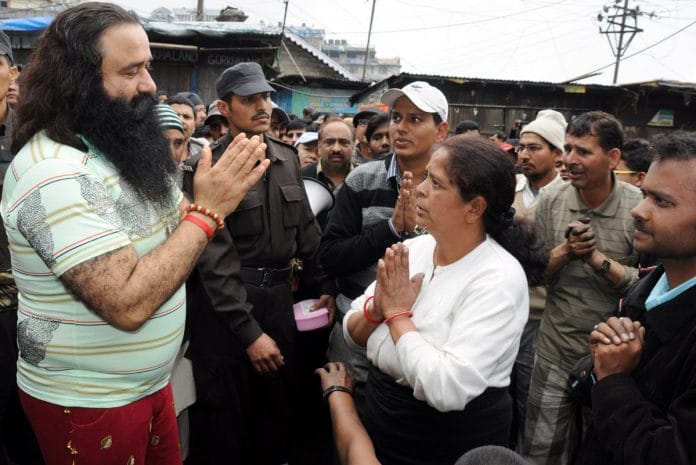The state’s effectiveness to deal with such a situation is under scrutiny, given Haryana’s reputation as a “soft” government incapable of handling law and order with an iron fist.
Haryana’s controversial godman, Baba Gurmeet Ram Rahim, was convicted Friday in a rape case by a CBI court in Panchkula. While in most cases, the exercise is a mere formality, given Ram Rahim’s massive following, it has become a law and order concern for Punjab and Haryana.
Besides the large number of Dera followers who gathered in Panchkula, in Punjab and Haryana they have gathered in naam charcha ghars, the places of congregation of the dera. According to Punjab police at some places they are are carrying weapons and petrol.
Consequently, unprecedented measures are being taken by the authorities should the supporters turn violent in the wake of an adverse order from the court.
For Haryana, in particular, the preparations go beyond maintaining law and order. What is under scrutiny is the state’s effectiveness to deal with such a situation, given Haryana’s reputation as a “soft” government incapable of handling law and order situations with an iron fist.
Last year, Chief Minister Manohar Lal Khattar watched meekly as Jat protesters demanding reservation agitated for days, openly looting and indulging in arson. While the police was on high alert even then and the army was called in, there was a virtual collapse of state machinery. 30 people died in three days in protest related violence.
Taking up a PIL over security arrangements in place for Ram Rahim’s appearance Thursday, the Punjab and Haryana High Court also flayed Haryana over its laxity in handling such situations.
The court observed that the state government had not learnt any lessons from last year’s jat reservation violence and allowed lakhs of dera supporters to gather in Panchkula.
During the course of the hearing, Panchkula police admitted that orders under section 144 of the CrPC that banned gathering of five or more persons had not been imposed till Thursday evening. “You are befooling the people in that case,” said acting chief justice S S Saron.
The state police got into a huddle late evening trying to set things right following High Court’s dressing down.
In 2014, when the Khattar government had just taken over, it faced a similar challenge. Baba Rampal, the head of the Satlok Ashram in Hisar, was summoned by the High Court in a contempt case. Rampal, who refused to abide by the court orders, remained holed up in his fortified ashram, even while non-bailable warrants were issued against him. The Haryana government had even then shown little promptness in handling the crisis, expressing its inability to arrest him immediately given the possibility of law and order disruption.
It is only when the home secretary and DGP were asked to appear in the court and directed that Rampal be arrested forthwith, did the government budge from its stand. A week-long violent standoff between the police and Dera supporters followed after which Rampal was finally arrested. Six persons were killed during the pitched battle.
In Punjab, the situation is tense because there is a possibility of Sikh bodies taking on Dera supporters should they get violent. Tensions among Dera followers and Sikhs have simmered for ten years, and clashes between the two are not uncommon. The latest confrontation took place less than a month ago when 14 Sikh radicals who tried to disrupt a Dera congregation in Patiala were arrested.
Editor’s Note: The first paragraph of the article was updated to reflect the conviction of the Gurmeet Ram Rahim Singh in the rape case.







It has been left to the High Court to instruct the police not to hesitate to use force if required.